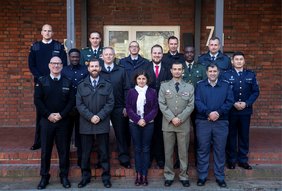Certified by the United Nations Department of Peace Operations, the UNSOC prepares military officers and civilians alike to be deployed to UN-Peace Operations all around the world. Fitting to the aim, the course is far away from a theoretical learning module which only teaches its participants about theoretical challenges. Its two-weeks long learning module is designed to teach the participants about the institutional framework of the UN within their mission as well as beyond and prepare them to plan and execute UN Peace Operations from day one. Additionally, specific topics are given by the UN to sensitize the participants for these crucial issues, including Gender, Human Rights, protection of civilians and many more.
A UN Peace Operations is the executing body of political goals that are usually set in New York. While one might argue that it is not necessary for military officers in such missions to know about these proceedings far away from their area of operation, the opposite is the case. To grasp these structures is essential for military officers and civilians alike to understand their mission as well as their mandate. Therefore, a variety of experts from academia and practice traveled to Hamburg to teach us about the role of the Security Council, the Secretary General, the Secretariat as well as the UN-Charta.
While the strategic goals of the UN-Peace Operation are set in New York by the aforementioned actors and institutions, it falls to the various departments, specifically the UN Department of Peace Operations, to operationalize these goals and transfer them from theory into practice. To comprehend this process, the course was taught about force generation, planning processes and the selection of UN personal for the operation.
On the ground, the mission is lead by the Special Representative of the Secretary General (SRSG) and his senior leadership team, which includes the Force Commanders, a military officer, the Police Commander, a police officer, and political and logistical officers, civilians. Since the military is only one part of the operation, it was vital to teach the participants of the structure as well as the modus operandi of a UN Mission HQ, especially between military, police and civilian officers. Lastly, the course was taught about the tactical level of a UN Peace Operation, which included the genesis as well as the possible content of Rules of Engagement, Self Defense, the mandate and International Humanitarian Law.
As already mentioned, Gender, Human Rights and Protection of civilians were among specific issue areas that broadened the participants’ perspective on UN Peace Operations. Additionally, a variety of speakers talked about Security Sector Reform, Demobilization, Disarmament and Reintegration as well as Early Recovery.
After two weeks of lectures, the participants were provided the opportunity to practice their newly acquired skills during a simulation which was prepared by the organizing staff of the FüAkBw. The task was to manage new developments in an ongoing UN Peace Operation in a fictional country. The challenge was to understand the task and mandate, analyze the recent developments of the mission and adapt the operational conditions and structures to enable the mission to face the new conditions while staying on the course outlined by the mandate.
With all that being said, there were things that the course could not teach: In field experience. Thanks to the experience of participants as well as the organizing staff, the course was able to acquire a sense of foresight for challenges that they will face in missions: As military officers as well as police or civil officers, they will be required to work with each other. This requires a sense of how the “other side” works and thinks to prevent miscommunication and mistakes. Additionally, UN Peace Operations are never conducted by one or only a few nations, but most often there are 20, 40 or even more nations involved. Therefore, on top of differences between military, police and civil officers come differences between nations and their respective cultures that can prove a serious challenge.
However, while these challenges can not be overcome by taking a course, being aware of these trip wires is the first and most important step to overcoming them. The course already experienced this during the exercise when military, police and civil officers from eight different nations not only had to analyze a situation together, but also formulate a course of action.
This course, and specifically the motivated and highly qualified organizing staff, provided its participants a high-value education and sensitized them for the challenges that can not be resolved during a course. Everything that is now missing for the participants is to go out (again) into UN Peace Operations. They are ready!

